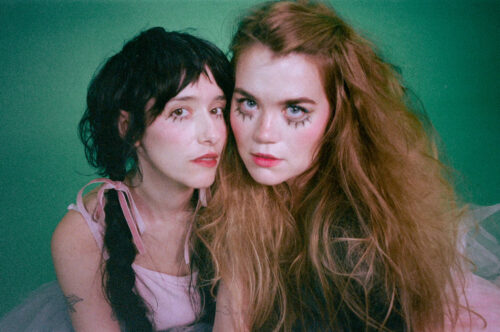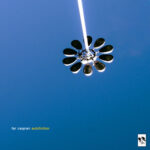Artist Interview: Daisy the Great
Posted: by The Alt Editing Staff

Photo by Alexa Ondrush
On Daisy the Great’s newest album The Rubber Teeth Talk, the rising alt-pop duo looks to dream sequences to access strengths and vulnerabilities. This eerie, transitional state grants Kelley Dugan and Mina Walker space to unlock the deepest parts of themselves and find comfort.
Back in 2017, their song “The Record Player Song” blew up on TikTok and took on a life of its own through edits, stitches, and other bite-size pieces of media. For better or worse, these platforms have upended the music industry, illuminating artists from the deepest corners of the universe and strengthening fan loyalty. While the song took on a life of its own, Dugan and Walker remain laser-focused on nourishing their intuition instead of chasing fleeting engagement.
I caught up with the NYC-based duo to talk about their gorgeous new album, how acting school informs their worldbuilding, and their mentors.
After your first headlining tour, you came back to New York City and lived normal lives. What domestic activities did you miss the most and how did this inspire your new album?
KELLEY DUGAN: I missed walking around. Tour is so exciting, obviously, but there’s so much travel and so much of it is sitting in a car. I really love to walk. One of the main things that I did right when I got back was to just start walking and moving. I also would take dance classes or things to get me out of my stuck feeling, like going around and seeing people.
MINA WALKER: Tour is a lot of group activity the whole time, which is super fun, but I need my alone time too. I like to go on super long walks, find new places, bring my notebook, and leave my phone. I’m on my phone a lot when I’m in the van, so it’s nice to take a break when I get home. I also like seeing friends and doing hobbies outside of music.
On tour, especially if you’re spending a lot of time on your phone, it can feel like there’s nothing other than music. That can sometimes be discouraging or make you feel like your world is very small or make you compare yourself to others. I try to do hobbies, like playing basketball with my partner, painting, and sewing.
The album sounds super expansive, and I can imagine part of that stems from oscillating between these new, unique experiences and your normal lives.
MW: Thank you! Relating back to the question of how the time went into writing the album, it is that feeling of your world growing and shrinking, depending on what pocket of life you’re in at the moment. And I think the album goes into different pockets of dreams, getting trapped in your head, and getting trapped in a comparison loop with other people.
You guys came onto the scene a couple years ago when you blew up on TikTok. Although that can really level the playing field for musicians, artists kind of risk being boxed in as “TikTok artists.” How did you galvanize that virality to ensure that your career was sustainable?
KD: It’s so interesting because we didn’t even put the song on TikTok. I think in some ways it hurt us that we weren’t the ones that were doing it, and in other ways it was a weird blessing because a lot of people know the song but don’t always link it to us. We have people that will discover our music now and then say, “oh my God, I just realized I know this other song by you!” Because of that kind of widespread way that that happened, it did afford us a little bit of anonymity. It was amazing that we had the opportunity to reach that many people and it totally changed the game for what type of world we were in.
We came out of that time opening for amazing artists and suddenly had a relatively stable- feeling tour schedule, which was not part of our lives before. In that way, it really welcomed us into the industry in a stronger way.
MW: The song is more famous than us, which is kind of awesome in some ways. I don’t think we as a band blew up on TikTok, which honestly would’ve been very helpful. Like Kelley said, it’s a blessing, but that’s not our goal.
We’d love for more and more people to hear our music, but I do think it’s easy to get boxed in, even with the song being as big as it is. There’s definitely times where people don’t expect us to have this much music based on hearing that one song of ours. I think “The Record Player Song” is still one of our best songs and we’re super proud of it.
KD: That was the first song we ever put out eight years ago.
MW: It feels like it’s our little kid that grew up and had its own life, you know? All the new music feels like it came from that seed, and I feel super proud of everything we’ve made since.
That’s so great! Now that TikTok has teeth in the industry, hopefully there’s more investment in artist development instead of letting people fade after their viral moment
KD: Yeah, plus it’s not fair for people that did have that experience to then be boxed in. They should have the opportunity to be heard in the same way and taken seriously.
MW: It’s also interesting the types of music that get boxed in when they’re viral on TikTok and the types that don’t. A lot of times, the types of music that don’t get boxed in are from men. It’s all good music, but I think indie-looking dudes who go viral often get a pass.
People like his music, but it’s not considered “TikTok music.” It’s just a band who blew up on TikTok. But then if it’s by femme people or queer people, that’s “TikTok music.” It’s just music and people are trying to market it. If you talk to any label, they’re gonna say you have to post. The whole marketing strategy, for better or for worse, is social media.
And it’s really great in a lot of ways, but also, hopefully there’s a change soon. As I’m scrolling through social media, I’m seeing more and more things marketed to me. I don’t know how much longer people are gonna be interested in this because it’s an ad pool. It is what it is at the moment, but I also don’t think people should be judged for doing their best to be heard.
For sure, it’s absolutely unavoidable at this point. Next question, how did you establish community in the absence of a more traditional DIY upbringing?
KD: I grew up in New York City. I’ve been around music and in a lot of different projects growing up, but we went to school for acting and so we were in a more acting, film, and TV and theater based environment. Towards the end of school, we started meeting more people that were studying music at NYU and Mina and I started working on music together. And it really did start from a DIY space in the Brooklyn scene. We started playing local shows, playing friends’ shows, opening for people, and following what felt fun.
MW: I always have to check back into our beginnings, our younger selves, because it never felt like an ego thing. When we started, it was super exciting because we wanted to play shows and make music with our friends.
We come from a performance-based background, so it was really exciting to have a band, book shows, and invite our friends, even though we were never headlining. For a while, we were performing without putting stuff out. And even when we started putting stuff out, we were always performing new stuff.
We learned on the fly. We started in a performance space and then we learned how to produce and what we wanted out of the live performance and how we wanted that to translate to recorded music. It was trial by error and I think we found some pretty unique sounds through doing that.
How do you think your acting background informs the aesthetics and the narratives of your music?
KD: It definitely informs our songwriting in the beginning of a song. We are really interested in the core of what’s happening in the song, story of the song, and the secret meanings within the song. If we’re not naming what this song is about, we want to talk about it while we’re writing it.
That process of analyzing material was key in our acting school. Our program focused on script analysis and spontaneous moment-to-moment acting. In some versions of our writing, we’re not saying the very difficult thing, but we’re revealing it through the art or the music videos or trying to build a world around the song that is very proofed.
We know what the story is and we’re letting it live in a bunch of different capacities. We’re building the world of the song with the analysis in mind, but also once you’re actually playing the song, you have to let go of all the things you planned and let it come out. It’s the same performing it live as when you’re recording it. We wanted to always feel fresh and those are things that we learned in acting school. It’s elevated beyond what’s in your brain in a very controlled way.
MW: That mindset too is helpful when you’re performing the same song for eight years. The feeling that you can breathe new life into something is very related to theater. The basis of theater is you perform eight shows a week forever, but it’s supposed to feel like you’re saying it for the first time. Like Kelley was saying with script analysis, there’s what’s being said, and then there’s what’s underneath.
Something we really take to heart with writing is what are we saying, and then what are we actually saying? It creates a more layered song with more immediate songwriting.
A song is so much more than the lyrics. You can tell a story with the instrumentals, the production. I’m sure coming from an acting background gives you that broad intuition.
KD: We also direct and edit a lot of the music videos. A different side of things, but we’re really interested in that type of creation. If we’re not video directing, we’re typically creative directing. We’re super hands-on, which always comes through.
You describe your songs as “diaristic.” What happens when someone’s narrative or experience conflicts with the other?
MW: A lot of times, we’ll defer to the person whose experience it is. Basically, there’s a song leader. For example, if a song is about Kelley’s trip to the dentist, I’m going to write it with her, but also check with her about – and that’s where the analysis comes in – the core of the song and what my entry point is.
It’s not like I’ve had the same experience as Kelley, but at the core of what she’s feeling at this scary moment at the dentist, where does my core meet her core? Sometimes if it’s conflicting, we’ll write a different part of the song and then put that together and see if it sounds cool to have the two different perspectives around the same idea.
KD: It happened with one of the songs on the record, “Mary’s at the Carnival,” which we wrote with Nardo, our guitarist. We were all sitting and writing different lyrics in our own space in the same room.
We started talking about what we were writing and they were not naturally cohesive, but once you put them all next to each other, it made for a really surprising and interesting take on what we were writing. So I think sometimes it might seem like they don’t go together, but when you put them in conversation, it changes the meaning or opens a door in that song. We welcome the differences.
What was your favorite instrument or texture or effect you used on your album?
MW: A lot of the stuff that sounds like synths is actually guitar with a crazy modulator. We found the weirdest alien tone and played it on a guitar because I thought it sounded like a synth but with a little more life to it.
KD: One of mine is in “Mary’s at the Carnival.” There’s a carnival sound that we made that’s layered whirly and Nardo has some effect on his HX stomp that he was using. Catherine Marks, who produced the album, was messing with all these different effects while we were trying to create this sound. That part of that song is really special. It’s this squeaky carnival sound and it always really puts me into that song.
MW: I also really like the filter drum part in bird bones where there’s a break and the fuzzy bass sleeves. And then suddenly the drum is in another space and more tapey. I like that part. I feel like it’s an empty breath in the middle of the album, which is otherwise stacked with sounds. I think that that moment is pretty spare and is very special in that song.
The album takes the listener through a dream sequence and touches on the things you discover about yourself and your subconscious thoughts. How did that motif come to be and what do you hope your listeners will learn about themselves through your album?
KD: Honestly, it came from us starting to write and talk about what was in our brains. A lot of the things we were talking about initially when we started writing the album were coming from dreams or from things we had experienced or moments we were stuck in our heads, which felt like dreams sometimes or reminded us of dreams. A lot of our album is very personal, so there was something about including the dream space that allowed us to be imaginative and not get too stuck in the real world.
MW: When we were writing it and now as we’re putting it out, there’s a bit of a need for some type of fantasy . It can be tough right now for everyone and we wanted to be honest with ourselves and where we were at and also create worlds that were places you could go. Not necessarily escapism, but places where you can feel the things you’re feeling and confront them in a dream or in another world and figure out other ways to process what’s actually happening to you. We had a lot of self-realization and grief that we were going through.
There was also a lot of letting go of all expectations, so we created the dream world as a place not to escape, but a place to feel what you wanna feel. The album is a lot about fear and criticism. We came out not on the other side of it, but with a new perspective on being comfortable in an uncomfortable time, or trusting yourself when you’re scared.
I hope this album is a place to go or a place to be held. I hope that it can be also like a playground and also a mirror when they need help facing themselves. Part of this record is about looking at yourself when it’s difficult and taking the time to be real with what’s going on and being brave about that. Not judging it and just letting it be.
Who are your mentors?
MW: Catherine Marks.
KD: That’s definitely true. My mom was an opera singer, so she was definitely the original mentor. My music theory teacher from high school, Mrs. Walter, has been a part of my life for a long time. She just came to our show at Rough Trade yesterday. My vocal coach, Don Lawrence, I would say is another mentor. From afar, I would also say Fiona Apple, even though I don’t know her.
I’ve made people my mentor and they don’t know yet, but one day I’ll tell ’em, I wish I had more mentors in the music space. My mom definitely started my love of music when I was young, but I think Catherine was one of the first people I met and looked up to because she’s been in it for a while.
MW: I don’t know if this counts as a mentor because they’re the same age as me, but I always look to my best friend Jack Haven. They’re always the first person I send an idea to besides Kelley. I trust they know me and love me and would never make a decision or tell me anything that would hurt me. I think they would only tell me things to help me. I really trust their opinion. We have similar brains and I feel the same way about Kelley.
I think the reason we’ve been able to be a band for so long is because of the trust we have in each other. If I’m feeling iffy about something and I go, “Kelley, is this okay?” and she’ll say yes, and that puts me at ease. I know I’ve got her back. I want to have older people in my life. It’s always refreshing when you meet somebody who has been in the business for a while and can calm you down.
KD: Catherine was the most immediate mentor. She’s a role model for us and somebody that we can look up to and learn from that is also 100% in our space with us. That’s a really unique position to be in because I feel like most of the time, you take what you learn from someone and then apply it in your life. Catherine came to our drummer’s house.
MW: She helped us feel confident while we were doing things. I never played guitar on our albums. I always would help write parts and then had someone else play it because I didn’t think I was good enough. And then she was like, “actually, I need you to play on this because the sound of the way you play guitar is unique and special and sounds better than something that’s perfect.” The best person is not telling you what to do, but breeding confidence in you. Everybody should surround themselves with people that do that.
The Rubber Teeth Talk is out now.
––
Giliann Karon
The Alternative is ad-free and 100% supported by our readers. If you’d like to help us produce more content and promote more great new music, please consider donating to our Patreon page, which also allows you to receive sweet perks like free albums and The Alternative merch. And if you want The Alternative delivered straight to your inbox every month, sign up for our free newsletter. Either way, thanks for reading!










